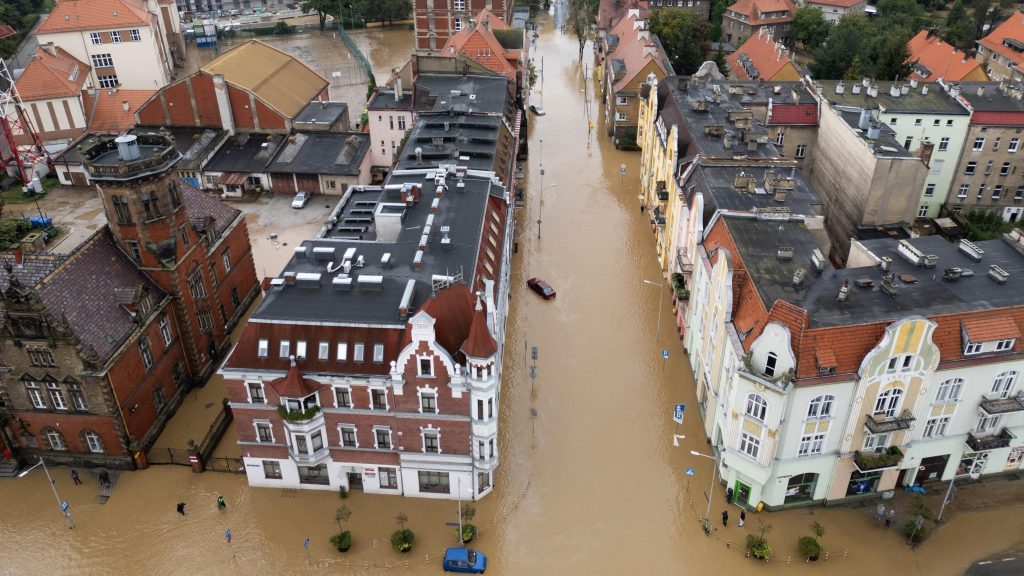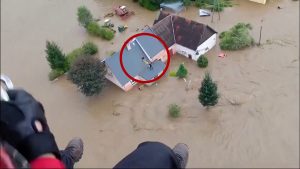Urgent Evacuation Ordered in Polish City Amidst Widespread Central European Flooding
3 min read

The mayor of Nysa, a city in Poland, has issued a critical evacuation order for its 44,000 residents as severe flooding continues to ravage central Europe. Mayor Kordian Kolbiarz urged all citizens to seek higher ground immediately due to the imminent threat of an embankment collapse that could unleash a massive surge of water from a nearby lake into the town.
The flooding, which began over the weekend, has resulted in at least 16 confirmed deaths, with Romania reporting seven fatalities. Other affected countries include Austria, the Czech Republic, and Poland. In Budapest, authorities have announced road closures near the Danube River, anticipating further flooding later this week.
Mayor Kolbiarz emphasized the urgency of the situation in a statement: “Please evacuate your belongings, yourselves, and your loved ones. It is crucial to move to the top floors of buildings right away because the incoming wave could reach several meters in height, flooding the entire town.”
In response to the crisis, Polish Prime Minister Donald Tusk has allocated one billion zloty (£197 million) for flood relief and announced plans to seek additional support from the European Union. A state of natural disaster has been declared in Poland. While some regions are seeing conditions stabilize, others remain on high alert as Storm Boris continues to wreak havoc.
The Danube River has overflowed in Slovakia, causing flooding in Bratislava’s Old Town. Water levels have surpassed 9 meters (30 feet) and are expected to rise further. Hungary is bracing for more severe flooding, with warnings in effect along 500 kilometers (310 miles) of the river. The Danube’s water level is rising by about a meter each day. To combat the rising waters, Budapest’s mayor has provided residents with a million sandbags, and tram services are suspended. Roads along the river are closed, and train services between Budapest and Vienna have been canceled. Hungarian Prime Minister Viktor Orban has postponed all international commitments due to the severe weather and ongoing flooding.

The Czech Republic has experienced the highest rainfall totals, with Jesenik receiving 473 millimeters (19 inches) of rain since Thursday—five times the typical monthly amount. The Czech fire service is delivering bottled water to isolated villages where tap and well water are likely contaminated. In Austria, St. Polten has recorded more rain in four days than during the wettest autumn on record from 1950. Chancellor Karl Nehammer announced the deployment of armed forces to assist affected areas, and €300 million (£253 million) in recovery funds will be allocated. Most political parties have suspended their election campaigns ahead of the federal elections on September 29.
Eastern Romania has also been severely impacted, with entire villages submerged. Emil Dragomir, mayor of Slobozia Conachi, described the devastating scene: “If you were here, you would cry instantly, as people are desperate. Their entire lives’ work is gone, and some are left with only the clothes on their backs.”

In Poland, thousands have been evacuated, including hospital staff and patients in Nysa. Roads have been severely disrupted, and many train services have been suspended. On Monday morning, the mayor of Paczków in southwestern Poland urged residents to evacuate due to overflow from a nearby reservoir threatening the town. However, in some areas, water levels are receding, and officials in Klodzko reported that the worst may be over. Video footage from Monday morning showed city center streets, which were inundated the previous day, now clear of water, although significant damage to buildings is evident.
Looking ahead, Storm Boris is expected to move southward into Italy, where it will intensify and bring heavy rainfall, particularly to the Emilia-Romagna region, with expected totals of 100-150 millimeters. The unprecedented rainfall in central Europe is attributed to a combination of factors, including climate change. The interaction of cold Arctic air with warm Mediterranean air created a “perfect storm,” and a persistent atmospheric pressure pattern kept Storm Boris in one location for an extended period. Scientists indicate that a warmer atmosphere can hold about 7% more moisture for each degree Celsius rise in global temperatures, contributing to more intense rainfall and storm systems.